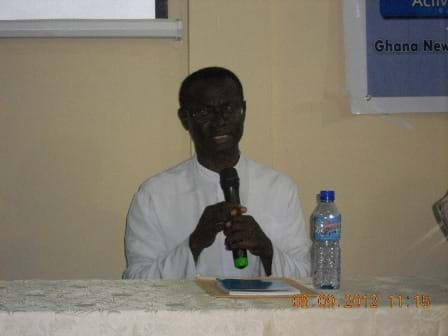The Reverend Father (Dr) Peter Nkrumah Amponsah of the Catholic University College of Ghana (CUCG) at Fiapre, near Sunyani, on Saturday called on the media to protect and preserve the sovereignty and freedoms of the citizenry.
He said the media should endeavour to adhere to ethical standards and values and not be a “conduit for political polarization”.
Rev. Fr. Amponsah made the call when speaking on the topic: “Exposure to Hidden Prejudices, Hate Speech, Stereotypes and Misconceptions - Approaches to a Responsible Use of Content and Language,” at a two-day workshop organized by the Ghana News Agency for its reporters and stringers (part-time correspondents) from Ashanti and Brong Ahafo Regions at Abesim, near Sunyani.
It is sponsored by STAR-Ghana and its partners on the theme: “Upgrading GNA’s Human Capacity for In-depth Coverage of Election 2012 and Beyond.”
Rev. Fr. Amponsah, who is also the Dean, Faculty of Information, Communication Science and Technology of the College, explained that journalists and editors functioned as mouthpiece of popular sovereignty in addressing issues of the common people.
He said the media should not in any way portray partisanship and ulterior motive in the course of its national duties but rather pursue agenda of neutrality and as pacesetter.
“The media should not let and use ideological competition within the political circles to create national strife and dissension.”
Rev. Fr. Amponsah noted with concern that the rapid expansion of media outlets in the current media environment had raised new concerns of political rhetoric and polarization of the citizenry.
He said the influence of the media on the production and reproduction of beliefs, opinions, stereotypes, prejudices and ideologies reflected in these presentations.
Rev. Fr. Amponsah observed that the media could only maintain their credibility and mandate as the watchdog in the proper use of content and language by being an effective agenda builder and setter combined with ethical journalism.
Rev. Fr. Amponsah expressed concern that instead of truthful and objective reporting, there were many revelations of uncivil expressions of hidden prejudices, stereotypes, hate and misconceptions in the media which were a threat to the nation.
Speaking on the: “Media Culture and Society - The Perspective of the News Agency Journalist,” Mr Muhammad Nurudeen Issahaq, Head of GNA Home Desk, said the act of communicating information had been a power transaction between rulers and the governed.
He said in a democratic dispensation, power distribution and the structure of society tended to influence ownership, control, content and agenda of the mass media.
“In societies which affirm that sovereignty is derived from the people, the individual’s access to the media is both enhanced and protected by law such as we find in Article 163 of the 1992 Constitution which provides that, “All state-owned media shall afford fair opportunities and facilities for the presentation of divergent views and dissenting opinions.”
“Over time, democratic governance and technological advancement have significantly transformed the power relationship between the media and society, taking a further step forward to empower listeners to contribute views/information on media platforms as we find in radio and television talk shows and phone-in programmes today,” he stated.
Mr Issahaq said the great transformation today, which accorded citizens direct access to intervene and express views on issues, presented both an opportunity and a challenge.
He therefore tasked both media practitioners and the participating citizenry to always take the national interest into consideration and allow circumspection to prevail in their engagements.
Other speakers included Mr Edward Ameyibor, former GNA Supervising Chief Editor and Mr Alex Lante Lawson, former GNA Home Desk Editor.
STAR-Ghana is a multi-donor pooled funding organisation funded by the British Department for International Development (DFID), the Danish International Development Agency (DANIDA), European Union (EU) and US Agency for International Development (USAID).
STAR-Ghana funding is to increase the influence of civil society and Parliament in the governance of public goods and services delivery, with the ultimate goal of improving the accountability and responsiveness of the government, traditional authorities and the private sector.
Source: Ghana News Agency








